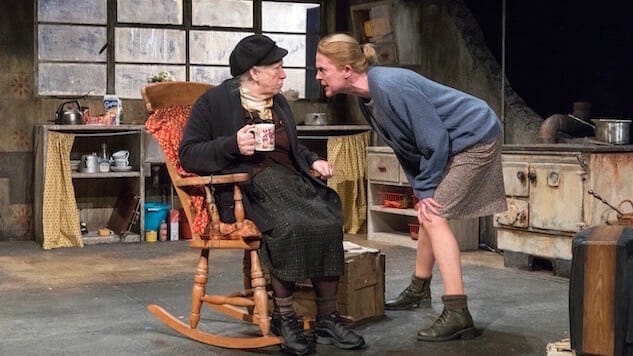Review: The Beauty Queen of Leenane
Richard Termine
It is Ireland, and so, it is raining.
The Beauty Queen of Leenane opens in the very early 1990s, into the floor of modest cottage, where an elderly woman is sitting alone in front of a TV set. Inclement weather beats against the window.
Revived by Druid Theatre almost 20 years after its premiere, the jet-black work of Martin McDonagh (The Lonesome West, The Cripple of Inishmaan, In Bruges) has aged well for a four-character, one-room play based in Leenane, an isolated village in Connemara, a wild, bare, and beguiling part of Ireland’s western seaboard.
Any frugality in terms of cast or setting belies this play’s weight, depth, and the quite extreme awfulness it contains. When it was first performed in London in 1997, audience members reportedly cried out in opposition to abuse meted out to the infirm 70-year-old Mag Folan (Marie Mullen) by her unmarried cohabiting daughter, Maureen (Aisling O’Sullivan).
Maureen, 40, bawdy, and brash, is overcome by the intense resentment she feels towards her demanding mother. They bitterly spar and snap at one another. The dialogue between Mag and Maureen is rhythmic and their delivery percussive: the pair trades quick, comic insults, spitefully finish sentences, and taunt each other with fractions of beats separating their salvos. It is Gilmore Girls, if Gilmore Girls was set in depressed rural Ireland 25 years ago, exclusively featured fighting, and was underscored by terror, loathing, and poor mental health.
The women’s private cycle of mutual distrust and two-way tyranny is disturbed by just one passing neighbor, a giddy young man named Ray Dooley (Aaron Monaghan). On this particular afternoon, Ray brings with him an invitation to a dinner dance, a real rarity, which his older brother, Pato (Marty Rea) is home from England to attend. Mag is determined to keep the invitation from her daughter, and in this she almost succeeds. Almost.
The twists are then several in an otherwise simple plot. In a pronounced rage, Maureen will go to the ball, and she’ll hit it off with the afore-mentioned Pato Dooley while there. She will bring him home later that night, bringing him, with a certain desperation, right into her small life, exposing herself to the strange blend of anguish this decision will entail.
Mullen returns in this staging as Mag, having played Maureen on Broadway last time around, and been awarded, in 1998, a Tony for best actress. Mullen is a high queen of Irish theater, and her talent finds its way around the character of Mag as effectively as any person acquainted with it might expect. Her vowels, her facial tics, her malice, and her comic timing are just right. When she is funny, she is hilarious.
O’Brien is excellent as Maureen, mean, while projecting abject oppression and emotional instability with as much steadiness and ease as those elements can possibly be brought across. Monaghan is lively and loose as Ray, the much-maligned messenger and the play’s Shakespearean fool.
But it is the absorbing recitation of the letter written to Maureen by Pato, by then returned to work on a construction site in England, that serves as satisfying ballast after the halfway mark. Marty Rea’s reading grants the production the oxygen necessary for the remainder.
The letter is the performer’s challenge but the audience member’s treat: frank, hopeful, and fond about the night of the party a declaration of abiding gratitude to Maureen for something ephemeral, or once-off. In a performance entirely free of applause between scenes, Rea’s monologue led to a spontaneous round at BAM Harvey Theater.
-

-

-

-

-

-

-

-

-

-

-

-

-

-

-

-

-

-

-

-

-

-

-

-

-

-

-

-

-

-

-

-

-

-

-

-

-

-

-

-








































